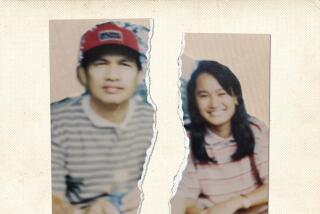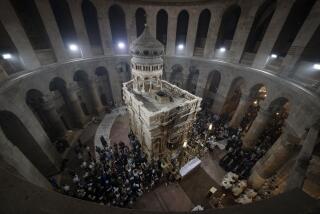Israel Has Eye on Christians Who Have Their Eyes on 2000
JERUSALEM — The proprietor of the Mount of Olives Hotel has seen it all.
There were guests who thought they were Jesus Christ and could cast out demons. Others who spoke in tongues. The woman from the American South who wandered the halls believing she was the Virgin Mary.
And lately, there’s been a flock of born-again Christians moving into the neighborhood to await the Second Coming of the Messiah.
“No question they actually believe this and that the voices they hear are real to them,” said Ibrahim Dawood, the American-raised Palestinian whose family owns and operates the modest hotel atop the Mount of Olives, biblical site of Jesus’ ascension to heaven and prophesied point of return. “Who am I to say? They think this is a front-row seat.”
As 2000 approaches, Israel is bracing for the arrival of more than 4 million Christian pilgrims and other tourists seeking to mark the millennium in the Holy Land. Among the vast majority of mainstream Christians are groups who believe that the change of century will herald the return of Christ. Some expect the end of the world.
The detention last week near Jerusalem of 14 doomsday cult members from the U.S. dramatized the fears of Israeli authorities who must strike a balance between preventing violence and allowing free worship.
Completing what they called Operation Walking on Water, Israeli police said the 14, including six children, were members of the Denver-based Concerned Christians cult, which reportedly plans to provoke an incident that will trigger Armageddon and hasten Christ’s arrival. The group was deported back to the U.S. on Friday night, but only after cementing in the minds of many the notion that the era of millennial madness--and hype--has dawned.
A Gamut From the Pious to the Crazed
The scores of “millennial Christians” who are already settling in and around Jerusalem run the gamut. They include the peacefully pious, the crazed doomsayers and, undoubtedly, not a few scam artists.
One group approached the Lutheran-run Augusta Victoria Hospital on the eastern side of Jerusalem asking to pitch a tent city for pilgrims on its grounds. The hospital declined.
About 100 or more self-described born-again Christians are renting small apartments from Muslim Palestinian families on the Mount of Olives. They have shed their last names, said goodbye to families, gotten rid of their passports.
They are here, they say, because God told them to come.
“Jesus is coming soon,” said Sister Sharon, a long-haired grandmother from Northern California who took up residence on the Mount of Olives three years ago. Her son, known now as Brother Raymond, joined her last year.
Raymond was a petty thief and pothead who had spent most of the previous 14 years in the California Youth Authority, until he found the Lord.
“I was starving inside, empty, just the kind of people God is looking for,” Raymond said. “He changed me overnight, filled me with more life than I ever knew. He woke me up. It was like a star burst inside me, and I just knew I had to be here.”
Raymond, who is from Grass Valley, Calif., speaks with the cadences of a down-home Southern preacher. In rapid-fire succession, he lists the prophecies of the Bible’s Book of Revelation that, he believes, have come true.
He wears rubber sandals and, on his lapel, a golden fish, the ancient symbol of Christianity. His forearm is covered with tattoos from his jail days.
A month ago, Sister Keren arrived from Florida. Her name was Karen, but she changed it to the Hebrew spelling and adopted the dress of Orthodox Jewish women--head covered with a hat, long skirt, dark tights, long sleeves. She wears Star of David earrings and a Star of David pendant, and occasionally a Star of David appears emblazoned on her forehead, she says, although only a few blessed people can actually see it.
Until Jesus Christ spoke to her and showed her the way, Keren said, she was a Las Vegas showgirl, a prostitute and an alcoholic.
“Now,” she said, “I dance for the Lord.”
Within days of her arrival, Keren, 49, married Raymond, 27, in a ceremony the details of which they decline to describe.
The Faithful Shed Many Worldly Goods
Sharon, Raymond and Keren all live in the Mount of Olives area near the tomb of Lazarus, whom the Bible says Jesus raised from the dead. They have shed many worldly goods, except for essential things like cellular telephones.
They pray weekly with Brother David, a preacher who hails from New York and who has lived in Israel off and on for 18 years.
David and the others say they use donations that they receive in the mail and from visiting Christians to pay their living expenses and to help clothe and feed local Arab families.
David is largely responsible for settling Christians in the Mount of Olives area, having initially rented from Arab residents 10 modestly furnished apartments that he sublets to arriving pilgrims, apparently for a small profit.
It is important to live in the land where God sent his son, Brother David says.
While most millennial Christians shy away from publicity, David, 58, seems to crave it.
“We’ve done 80 interviews since March, and lately it’s been five a day,” he said, a 2-inch-thick Bible in hand. “We did CNN twice.”
David uses the attention to spread the word about his tiny ministry and to solicit donations. He has started to grow a bit uneasy, however, about repeated questions concerning his legal status.
Since he proudly claims to have destroyed his passport and to eschew any visa or paperwork, David, like many of those who surround him, would be vulnerable to prosecution or deportation should Israeli authorities decide to take action.
In the wake of the Concerned Christians episode, there has been a heightened sense of alarm in some quarters of the Israeli public. How to deal with millennial Christians is problematic for Israeli authorities.
Many fundamentalist Christians, including mainstream groups, are ardent supporters of Israel, Zionism and the center-right government of Prime Minister Benjamin Netanyahu.
For literal interpreters of the New Testament, the founding of the state of Israel and the gathering of the Jewish people to this land constitute steps leading to the Second Coming of Christ.
On the other hand, Israel is concerned about violence.
Authorities have received warnings about scenarios that could be acted out by Christian extremists and apocalyptic cultists. Failing to see the Messiah, they might attempt mass suicide or try to damage mosques on the Temple Mount to prepare for the raising of the Jewish Temple, another biblical prophecy that foreshadows the return of Christ.
Police and Health Ministry officials also predict an increase in the psychiatric condition known as the Jerusalem syndrome, in which visitors are swept up in religious fervor and begin to believe that they are biblical characters.
Muslims too are taking note of the possibilities. In a Ramadan prayer service on Friday at Jerusalem’s revered Al Aqsa mosque, cleric Hayan Idrisi warned an estimated 200,000 worshipers that doomsday cults are part of a great American conspiracy to destroy the global Muslim community.
Cultists a Source of Dismay to Evangelicals
The presence here of the Concerned Christians cult, as well as the Brother Davids of the world, is dismaying to many of the mainstream evangelical Christian groups that are also planning large pilgrimages to Israel in 2000.
David Parsons, spokesman for Jerusalem’s International Christian Embassy, which represents numerous evangelical congregations worldwide, said the furor surrounding the detention of the cult members last week damages work by legitimate Christians.
“We’ve put in many, many years of labor helping the Israeli public understand Christianity and Christians coming here, and to help Christians understand the Jewish people and their history,” Parsons said. “We want to allay some of the fears in Israel. We have to speak a little louder than these fringe, isolated groups that make the front pages.”
Parsons noted that even for those who believe in and anticipate the Second Coming, there is no biblical foundation to tie it to a specific date.
Israeli Internal Security Minister Avigdor Kahalani said in an interview that additional police will be deployed to patrol the streets and guard religious sites during the months leading up to 2000.
The government so far has declined to adopt a plan to require visas for visitors as a way to better control who is entering the country.
Police maintain that cultists traveling as tourists could assume aliases in order to find a way in.
More to Read
Sign up for Essential California
The most important California stories and recommendations in your inbox every morning.
You may occasionally receive promotional content from the Los Angeles Times.











